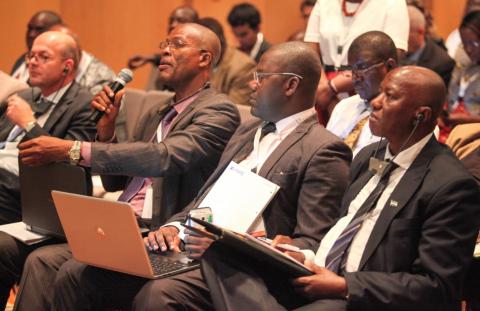Outcomes of the Dakar Sustainable Energy Forum
Energy experts concludes three-day sustainable energy forum with high expectations for greater progress in the development, investment, and harnessing of renewable energy potentials of the ECOWAS region.
ECOWAS – Dakar, Senegal 13th October 2017 – Representative from development partners, financial institutions, utilities, private sector investors and civil society organizations from the ECOWAS region and beyond have committed themselves to creating a conducive environment for investment in the renewable energy sector in the ECOWAS region. The experts believe that this could be achieved through an attractive regulatory and legal framework, removing multiple barriers impeding the widespread investment in renewable energy and energy efficiency in the region.
At the end of the first edition of the ECOWAS Sustainable Energy Forum (ESEF2017) held in Dakar, Senegal from 11- 13 October, delegates stressed the urgent need for more committment at the national level from member states. Thus, they called on ECREEE to provide the necessary technical support for the implementation of renewable energy and energy efficiency policies in order to achieve the ambitious goals of the region.
Over the course of the 3-day deliberation, the forum identified specific challenges preventing the uptake of viable renewable energy and energy efficiency market in the ECOWAS region. Through a series of presentations, panel discussions and side-events stakeholders committed to working towards achieving a viable sustainable energy market in ECOWAS. The lack of Innovative solutions, unreliable power supply, lack of storage, and transmission and distribution bottlenecks were revealed as some of the key challenges to sustainable energy delivery. The Forum called for a harmonized energy market and concerted approach among member state.
On the issue of power infrastructure and human resources, the forum recommended the creation of solid and sustainable facilities with highly qualified staff, sharing of good practices such as technology-transfer and capacity-building. The Forum observed that some countries seems fared better than others in terms of capturing investment in the renewable sector and therefore suggested more synergies as well as sharing of experiences for the benefit of all member countries.
Aside from providing a platform for B2B and public-private partnerships, one of the main outcomes of ESEF2017 was the adoption of the roadmap for the West African Solar Corridor in collaboration with IRENA.
This flagship initiative under the leadership of ECREEE will drastically change the paradigm when it comes to meeting the region’s energy demand in a sustainable manner.
The West African Solar Corridor is a component of the West African Clean Energy Corridor, which aims at harnessing renewable energy resources through utility-scale power plants and trans-boundary trade of electricity to meet a significant share of the region’s demand for electricity. Through the Solar Corridor 2GW and 10 GW are targeted by 2020 and 2030 respectively.
Addressing the closing ceremony, the Commissioner for Energy and Mines at the ECOWAS Commission, Dr. Morlaye Bangoura conveyed the gratitude of the President of ECOWAS to all delegates. He emphasized the ECOWAS gratitude to the development partners who have supported the institution and its agencies particularly ECREEE. He recognized the success of ECREEE, which has become a model in the world under the leadership of its Executive Director, Mr. Mahama Kappiah. He singularly, thanked, UNIDO, AECID, Austrian Development Corporation, World Bank, the EU, GIZ and AfDB. He described the forum as a great success and thanked all partners such as Solektra for their support. In closing, Dr. Bangoura noted that despite the progress made in the region, stakeholders should continue to work steadfastly in order to achieve the ambitious sustainable energy targets for ECOWAS citizens. He said, the time for talking is over and we must move from plans to action.
Also speaking at the closing ceremony, Mr. Abdou Fall, president of the Senegalese Council for Renewable Energy (COPERES), called for improving the regulatory and legal framework that would enable the local private sector’s full participation in the sustainable energy projects and programme. He therefore stressed the need for dialogue towards this direction between public and private sector actors.
In his official closing remarks, the adviser to the Senegalese Prime Minister in charge of Energy, Mr. Demba Gaye thanked ECREEE for choosing Dakar as the venue for the first edition of the ECOWAS Sustainable Energy Forum (ESEF 2017). He highlighted the efforts made by the government of Senegal through Emerging Senegal Plan (PSE) under the leadership of HE Macky Sall. He described the Senegal’s rural electrification program, which has reached 35% in two years and is set to reach 70% by the end of year as a result of ambitious projects DPER, PUER and PUDC. He recognized ASER’s maverick role and described it as of great importance to the overall fight against extreme poverty in rural Senegal. Additionally, Mr. Gaye, highlighted that Senegal has commissioned more than 70 MW of solar and in the next 6 months the country will have more than 100 MW of Solar under the hospice of Senelec.
On the sideline of the forum, several individuals, organizations, institutions, companies, and countries were honoured with awards in recognition of their efforts in championing access to renewable energy and energy efficiency in our region. They include Enda Energie, Touba Solar, AFD/Proparco, ASER, Dr. Morlaye Bangoura (ECOWAS), UNIDO, AECID, Austrian Development Corporation, EU, GIZ, Ministry of Petroleum & Energies – Senegal, Ministry of Energy – Sierra Leone, Ministry of Energy and Water – Mali, Ministry of Energy – Niger, Ministry of Energy – Ghana, Ministry of Mining and Energy – Burkina Faso.
The ECOWAS Centre for Renewable Energy and Energy Efficiency (ECREEE) organized the forum on the theme “Renewable Energy and Energy Efficiency in West Africa: from Plans to Action.





